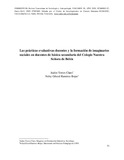| dc.rights.license | http://creativecommons.org/licenses/by-nc-sa/3.0/ve/ | es_VE |
| dc.contributor.author | Torres Clar, Jaider | |
| dc.contributor.author | Ramírez Rojas, Nelsy Gliced | |
| dc.date.accessioned | 2020-12-03T15:04:32Z | |
| dc.date.available | 2020-12-03T15:04:32Z | |
| dc.date.issued | 2020-12 | |
| dc.identifier.issn | 0798-3069 | |
| dc.identifier.uri | http://www.saber.ula.ve/handle/123456789/47162 | |
| dc.description.abstract | El presente artículo da cuenta de una investigación, cuyo objetivo general fue establecer si existe
o no una relación entre las prácticas evaluativas docentes y la forma como estas influyen en la
creación de imaginarios sociales. Para el desarrollo de la investigación se tuvo en cuenta una
metodología cualitativa, para lo cual se emplearon tres instrumentos, una entrevista
semiestructurada aplicada a los maestros, una observación en el aula y una encuesta a estudiantes.
Para analizar la información, se realizó un proceso de categorización y triangulación, haciendo uso
del software Atlas.ti. Se concluyó que los procesos evaluativos siguen siendo tradicionales y que,
aunque se habla reiteradamente de evaluación integral, esta sigue teniendo como foco lo cognitivo.
De igual forma, en cuanto al objetivo general, conocer si existe una relación entre la forma de
evaluación los maestros evaden la pregunta y reconocen que muchas de sus prácticas están
influenciadas por la forma como fueron evaluados, pero en ningún momento reconocen que su forma de
evaluar puede contribuir a que los estudiantes cambien su visión del mundo. | es_VE |
| dc.language.iso | es | es_VE |
| dc.publisher | SaberULA | es_VE |
| dc.rights | info:eu-repo/semantics/openAccess | es_VE |
| dc.subject | Evaluación | es_VE |
| dc.subject | Imaginarios sociales | es_VE |
| dc.subject | Evaluación integral | es_VE |
| dc.subject | Formas de evaluar | es_VE |
| dc.title | Las prácticas evaluativas docentes y la formación de imaginarios sociales en docentes de básica secundarias del Colegio Nuestra Señora de Belén. | es_VE |
| dc.title.alternative | The teaching evaluation practices and the formation of social imaginaries in elementary school teachers of the Nuestra Señora de Belén School. | es_VE |
| dc.type | info:eu-repo/semantics/article | es_VE |
| dc.description.abstract1 | This article reports on research, the general objective of which was to establish whether or not
there is a relationship between teacher evaluation practices and the way in which they influence the
creation of social imaginaries. For the development of the research, a qualitative methodology was
taken into account, for which three instruments were used: a semi-structured interview applied to
teachers, a classroom observation and a student survey. In order to analyze the information, a
categorization and triangulation process was carried out, making use of the Atlas.ti software. It
was concluded that the evaluation processes are still traditional and that, although there is
repeated talk of integral evaluation, it continues to focus on the cognitive. Similarly, in terms of
the general objective, to know if there is a relationship between the form of evaluation, teachers
avoid the question and recognize that many of their practices are influenced by the way they were
evaluated, but at no time do they recognize that their form of evaluation can contribute to students
changing their view of the world. | es_VE |
| dc.description.colacion | 51-78 | es_VE |
| dc.description.email | fermenta@ula.ve | es_VE |
| dc.description.frecuencia | Cuatrimestral | |
| dc.description.paginaweb | www.saber.ula.ve/fermentum | |
| dc.identifier.depositolegal | pp1991102ME302 | |
| dc.publisher.pais | Venezuela | es_VE |
| dc.subject.institucion | Universidad de Los Andes | es_VE |
| dc.subject.keywords | Evaluation | es_VE |
| dc.subject.keywords | Social imaginaries | es_VE |
| dc.subject.keywords | Integral evaluation | es_VE |
| dc.subject.keywords | Ways of evaluating | es_VE |
| dc.subject.seccion | Fermentum: Artículos | es_VE |
| dc.subject.tipo | Artículos | es_VE |
| dc.type.media | Texto | es_VE |


